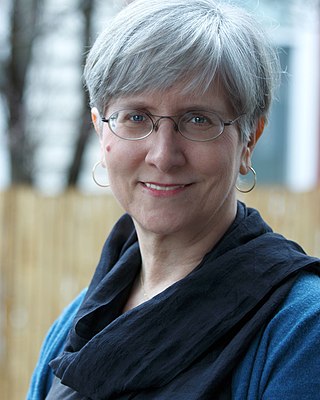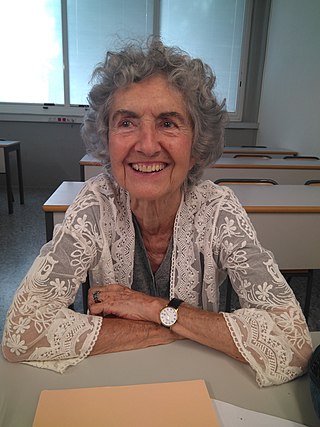
Feminist economics is the critical study of economics and economies, with a focus on gender-aware and inclusive economic inquiry and policy analysis. Feminist economic researchers include academics, activists, policy theorists, and practitioners. Much feminist economic research focuses on topics that have been neglected in the field, such as care work, intimate partner violence, or on economic theories which could be improved through better incorporation of gendered effects and interactions, such as between paid and unpaid sectors of economies. Other feminist scholars have engaged in new forms of data collection and measurement such as the Gender Empowerment Measure (GEM), and more gender-aware theories such as the capabilities approach. Feminist economics is oriented towards the goal of "enhancing the well-being of children, women, and men in local, national, and transnational communities."
Saba Mahmood (1961–2018) was professor of anthropology at the University of California, Berkeley. At Berkeley, she was also affiliated with the Center for Middle Eastern Studies, Institute for South Asia Studies, and the Program in Critical Theory. Her scholarly work straddled debates in anthropology and political theory, with a focus on Muslim majority societies of the Middle East and South Asia. Mahmood made major theoretical contributions to rethinking the relationship between ethics and politics, religion and secularism, freedom and submission, and reason and embodiment. Influenced by the work of Talal Asad, she wrote on issues of gender, religious politics, secularism, and Muslim and non-Muslim relations in the Middle East.
Randy Pearl Albelda is an American feminist economist, activist, author, and academic who specialises in poverty and gender issues.
Marianne A. Ferber was an American feminist economist and the author of many books and articles on the subject of women's work, the family, and the construction of gender. She held a Ph.D. from the University of Chicago.

Julie A. Nelson is an emeritus professor of economics at the University of Massachusetts Boston, most known for her application of feminist theory to questions of the definition of the discipline of economics, and its models and methodology. Nelson received her Ph.D. degree in economics from the University of Wisconsin–Madison. Her work focuses on gender and economics, philosophy and methodology of economics, ecological economics, and quantitative methods. Nelson is among the founders and the most highly cited scholars in the field of feminist economics.

Feminist Economics is a peer-reviewed academic journal published by Routledge and the International Association for Feminist Economics (IAFFE) in the field of feminist economics.

Lourdes Benería is a Spanish–American economist. She was Professor Emerita at Cornell University's Department of City and Regional Planning. The author and editor of many books and articles, her work has concentrated on topics having to do with labor economics, women's work, the informal economy, Gender and development, Latin American Development and globalization. Before Cornell, she taught at Rutgers University and has given courses in other international centers. She worked at the ILO for two years and has collaborated with other UN organizations, such as UNIFEM and UNDP, and with several NGOs. She obtained her PhD at Columbia University in 1975.

Michèle Pujol, was a French intellectual, feminist, economist, scholar, and human rights activist. She was an assistant professor at the University of Victoria's Department of Women's Studies and held a chair at the University of Manitoba. She was a significant feminist economic scholar and an advocate of social justice.

Violet Eudine Barriteau,FB, GCM, is a professor of gender and public policy, as well as Principal of the University of the West Indies at Cave Hill. She was also the president of the International Association for Feminist Economics (IAFFE) from 2009 to 2010, and she is on the advisory editorial boards of Palimpsest: A Journal on Women, Gender, and the Black International, published by SUNY Press, and Signs: Journal of Women in Culture and Society, published by University of Chicago Press.

The International Association for Feminist Economics (IAFFE) is a non-profit international association dedicated to raising awareness and inquiry of feminist economics. It has approximately six hundred members in sixty-four countries. The association publishes a quarterly journal entitled Feminist Economics. Since 1998 IAFFE has held NGO special consultative status.
Edith Kuiper is the assistant professor of economics at State University of New York at New Paltz, and she was the president of the International Association for Feminist Economics (IAFFE) from 2006 to 2007.
Myra H. Strober is professor of education, emerita, for the school of education, at Stanford Graduate School of Business, Stanford, California, US. She also sits on the editorial board of Feminist Economics, and was the president of the International Association for Feminist Economics (IAFFE) from 1997 to 1999.
Jean A. Shackelford, is the professor of economics emerita in the department of economics at Bucknell University, Lewisburg, central Pennsylvania, US and, from 1993 to 1995, was the president of the International Association for Feminist Economics (IAFFE). Her book Economics: a tool for critically understanding society, co-written with Tom Riddell, Stephen C. Stamos and Geoffrey Schneider, is now in its ninth edition.
Robin L. Bartlett is a professor of economics at Denison University. She was among the founders of the International Association for Feminist Economics (IAFFE), and served as its president from 2005 to 2006.

Yana van der Meulen Rodgers is a professor in the Department of Labor Studies and Employment Relations in the School of Management and Labor Relations at Rutgers University,. She also serves as Faculty Director of the Center for Women and Work at Rutgers.
Şemsa Özar(Þemsa Özar) is a professor in the Department of Economics at Boğaziçi University, Turkey and past president of the International Association for Feminist Economics (IAFFE), her tenure was 2015 to 2016.
Silvia Berger works at the Ministry of Economics and Production in Argentina, Latin American Council of Social Sciences (CLACSO), and is a post-graduate university teacher at the Latin American Social Sciences Institute. and past president of the International Association for Feminist Economics (IAFFE), her tenure was from 2017 to 2018. 7 Berger is a member of the editorial committee for the Mexican journal Ola Financiera.
Marilyn ('Lyn') Ossome is an academic, specialising in feminist political theory and feminist political economics. She is currently Senior Research Associate of at the University of Johannesburg and a member of the advisory board for the Strategic Initiative for Women in the Horn of Africa, amongst other accolades. She is an editorial board member of Agrarian South: Journal of Political Economy, and in 2021, she co-edited the volume Labour Questions in the Global South. She serves on the executive committee for the Council for the Development of Social Science Research in Africa (CODESRIA). She is the author of Gender, Ethnicity and Violence in Kenya’s Transitions to Democracy: States of Violence.








